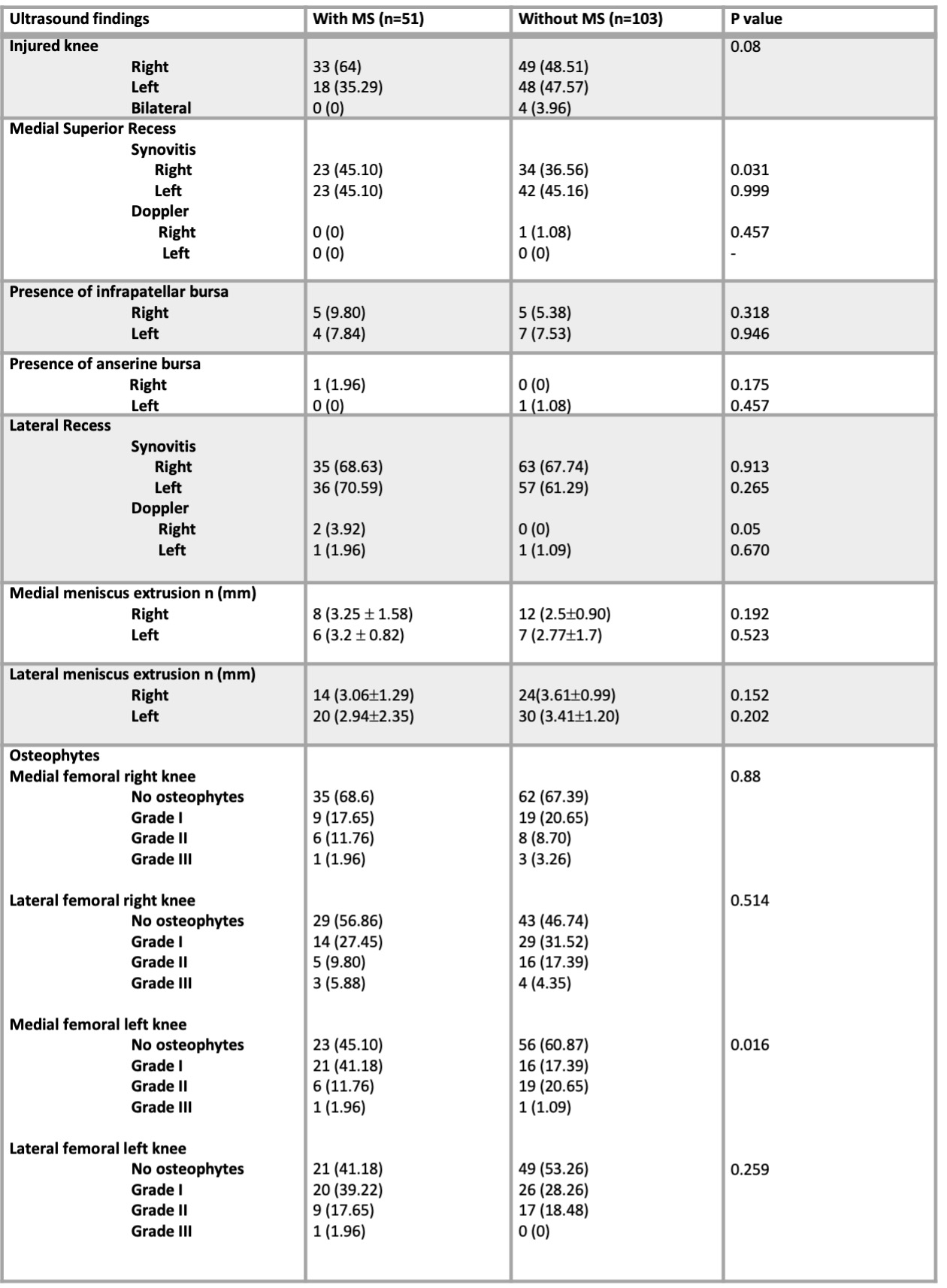Session Information
Session Type: Poster Session C
Session Time: 9:00AM-11:00AM
Background/Purpose: Osteoarthritis (OA) is a common disorder with increased incidence with age. Metabolic syndrome (MS) is frequently associated with OA, although other factors are considered the primary cause of the development of OA, such as: genetic, inflammatory, neuroendocrine, and mechanical stress. Conventional radiography (CR) is used to diagnose the changes of knee OA (KOA) (joint space, osteophytes, sclerosis); however early changes are difficult to assess, and few articles report these abnormalities. Previous research demonstrated a higher sensibility in ultrasonography (US) in detecting early abnormalities compared to CR in early knee OA (eKOA). The objective of this study is to estimate the impact of metabolic syndrome in relation to prevalence of US findings and quality of life in patients with eKOA.
Methods: We included patients with eKOA diagnosis from out-patients clinical of rheumatology department, eKOA was describe as grade I and II by Kellgren and Lawrence scale. We evaluated for presence of metabolic syndrome based of ATP-III. Using a structured clinical questionnaire, we recorded epidemiologic data. Quality of life and joint functionality was evaluated with Lequesne index, EQ-5D and WOMAC. Patients were divided in two groups: eKOA with and without MS. An US was performed in each patient, structural changes in eKOA we evaluated was based in the OMERACT definitions. The structures evaluated include medial superior and lateral recess, anserine and infrapatellar bursitis, medial and lateral meniscus extrusion were scanned in each knee.
Statistical Analysis. Descriptive analysis of variables was done. In order to compare two variables, we used bivariate analysis, using t-student, Wilcoxon test, chi2
Results: We include 154 patients, female 132 patients (85.7%) vs. 22 men (14.3%). 51 (33%) patients with MS vs. 108 (67 %) without MS; of MS patients there were 9 (41%) men vs. 42 (59%) women (p=0.402). Median age of females was 47.03 ± 6.85 vs. 46 ± 7.43 in males (p=0.519). The patient with MS realized less physical activity compared with patients without MS. 78.2 % without MS vs. 21.8% (p=0.02). The patient with MS reported some comorbidities: Diabetes Mellitus 38.46%, hypertension 42.1%, hypothyroidism 7.69% and others 13.73% vs patients without MS: Diabetes Mellitus 10.71%, hypertension 17.86 %, dyslipidemia 7.14, venous insufficiency 46.43%, other 17.86 (p=0.003). We found statistical significance in the metabolic syndrome group finding synovitis in medial superior recess of the right knee (p =0.031) and Doppler activity in lateral recess of right knee (p=0.05), without significance in the presence of osteophytes. Quality of life and functionality we did not find statistical significance. (Table 1)
Conclusion: Patients with eKOA have a good QofL. The ultrasound could have an important role in eKOA to find risk factors of progression and phenotypes. There are increased prevalence of risk factors in MS patients.
To cite this abstract in AMA style:
Gonzalez-Hernandez M, Espinosa-Morales R, Pineda C, Peña A, Bernal A, Alabarda A. Impact of Metabolic Syndrome on Ultrasonographic Findings and Quality of Life in Patients with Early Osteoarthritis [abstract]. Arthritis Rheumatol. 2023; 75 (suppl 9). https://acrabstracts.org/abstract/impact-of-metabolic-syndrome-on-ultrasonographic-findings-and-quality-of-life-in-patients-with-early-osteoarthritis/. Accessed .« Back to ACR Convergence 2023
ACR Meeting Abstracts - https://acrabstracts.org/abstract/impact-of-metabolic-syndrome-on-ultrasonographic-findings-and-quality-of-life-in-patients-with-early-osteoarthritis/

